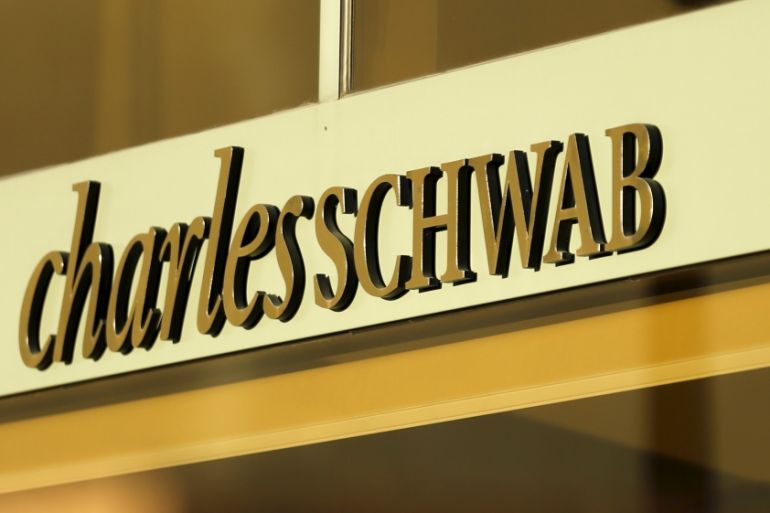Charles Schwab in talks to acquire smaller rival TD Ameritrade
CNBC reports discussions are under way, as analysts describe potential merger as offering ‘substantial cost synergies’.

Charles Schwab Corp, the largest discount broker in the United States financial sector, is in talks to buy rival TD Ameritrade, CNBC reported, as profits in the industry come under pressure from a shift to zero commission.
CNBC did not provide any financial details on the deal, but Fox Business pegged the value at $26bn, citing sources. At that price, it would be a premium of roughly 18 percent compared with Ameritrade’s market capitalisation.
Keep reading
list of 4 itemsStocks slide on Middle East tensions as hope crisis contained stems losses
As US inflation ticks back up, it could impact the presidential election
Will the US unemployment rate continue at historic lows?
Shares of TD Ameritrade surged more than 26 percent to $52.54 in trading before the bell on Thursday. Meanwhile, Charles Schwab shares jumped 15 percent to $51.79.
Neither companies responded to requests for comment from the Reuters News Agency.
A deal between Charles Schwab and TD Ameritrade could be seen as a response to recent disruption in the industry, where nimbler startups such as Menlo Park, California-based Robinhood are rapidly gaining market share by eliminating commissions on stock trades.
Charles Schwab was among the first few brokerages to eliminate commissions on online trading of stocks, options and exchange-traded funds – a move that was quickly followed by rivals, including Fidelity Investments, E*Trade Financial and TD Ameritrade.
Generally, the internet has allowed for a huge increase in discount brokers that give individuals or families with modest amounts of investment money the opportunity to trade in a cheaper and easier way.
‘We are on offence’
Pressure on the discount broker business model has been rising in recent years, as the increased use of technology required huge spends on platforms but also undermined the fees charged to administer equity trades.
Earning less cash from trading commissions has placed increased focus on other areas such firms can make money, in particular managing the pool of customer assets which these firms control.
But the three interest rate cuts seen this year make income from investing customer balances less lucrative. The profitability of online brokerages has been stunted, as the firms earn less money off customer balances.
Schwab earned about half of its more than $10bn in revenue in 2018 from interest earned. That is under pressure as rates go lower amid talk of the potential for negative interest rates, making other sources of revenue more important.
“This is largely about scale,” Argus Research Analyst Stephen Biggar said. “I believe a merger could present substantial cost synergies.”
If the deal goes through, the combined entity would control a majority of a market that has been ravaged by price wars between the biggest players.
The combined company, expected to be led by Schwab’s Chief Executive Officer Walt Bettinger, will have total assets of $5 trillion.
Bettinger had indicated last month that the company would aggressively consider strategies to give it more scope.
“I do want to be crystal clear, we are on offence at Schwab. We’re not resting on our laurels,” he said.
“We’re pushing ahead aggressively,” Bettinger added. “Our efforts include an emphasis on scale and efficiency.”
A potential deal could give Schwab an edge in the price war that has plagued the ultra-competitive industry.
It remains to be seen whether creating such a dominant player within the industry would draw attention from antitrust regulators.
“Because Schwab just cut commissions to zero, then bid for their most hindered competitor, that could lead to legal challenges and will likely draw anti-competitive scrutiny,” UBS analysts wrote in a research note.
The deal could also force E*Trade, the third-largest discount broker, to look for possible acquisitions. Shares of E*Trade were down nearly five percent following the CNBC report.